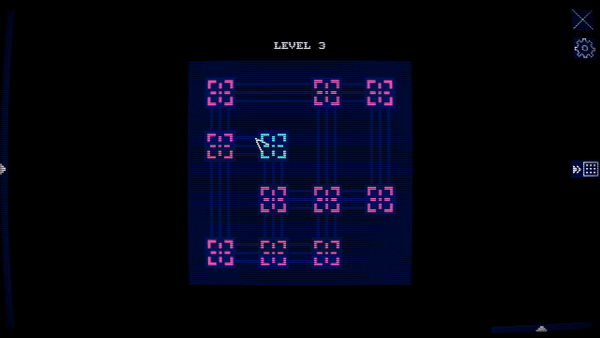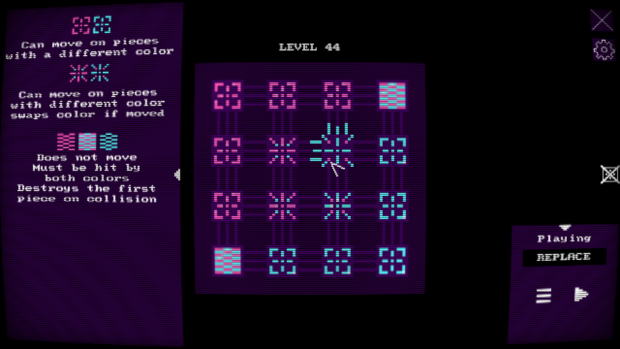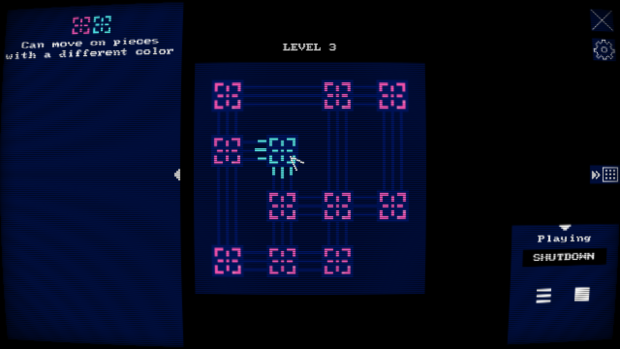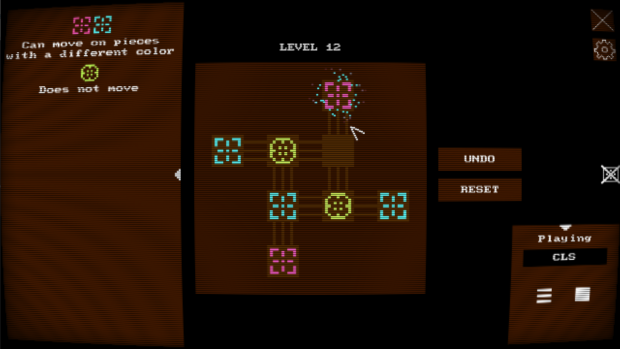
Review Fix chats with Hack Grid developer Martin Firbacher, who details the game’s origin and more.
Review Fix: How was this game born?
Martin Firbacher: Originally I made a small web browser game called Squares. I wasn’t really happy with how it turned out though. It was too short, the sounds and music were free assets and the game felt quite amateurish. I felt like the idea behind the game deserved a proper treatment, so I set out to make it bigger and better.
Review Fix: What is your role in the game?
Firbacher: I’m a solo developer, the only help I had was with playtesting.

Except for the text fonts, I did everything by myself!
Review Fix: What has development been like?
Firbacher: It’s been an amazing experience all in all. In the beginning I struggled with how the game should look.
I am not a very good artist, but I got an idea that making the game look, sound and feel like a DOS game would be both fun and doable for me.
I’ve never composed any music before, so I even went as far as learning the very basics of music theory.
When I was composing the music, I was thinking back to my childhood, the games I played and how they sounded.
I would also listen to some sound blaster music, for inspiration. At first I wanted to use old school programs for the soundtrack’s creation,
such as Adlib Tracker II or Reality Adlib Tracker, however they were too difficult for a beginner like me, so I settled for LMMS and Sound Blaster 16-like Soundfont.
The only thing that stopped me from feeling like a game developer from the 80’s were the modern tools I used to make Hack Grid.
Review Fix: What makes this game special?
Firbacher: Definitely the DOS-era feel, especially the audio that simulates Sound Blaster 16! The levels are quick to restart if you get stuck and the largest game board is 4×4. This makes the game enjoyable even for people who don’t play puzzle games in general.
Review Fix: What games influenced this one the most?
Firbacher: Spear of Destiny is the first game I ever played and where I heard what Sound Blaster sounds like. That’s where my love for DOS gaming comes from.

Review Fix: Any fun stories or wild moments during development?
Firbacher: During playtesting, there was one level that nobody, except me could beat. The level was impossible to beat, however there was a sneaky bug related to the Undo button.
This is how I was able to beat the level and also what led me to discovering the bug.
Review Fix: What were the major lessons learned?
Firbacher: If you’re gonna include localization, prepare your code for it ahead of time and make sure the font you are using supports all the scripts and alphabets you are gonna need. I didn’t do that and I had to crunch really hard one week before the release. As a result, the game ended up using 3 different fonts.
One extra for Russian localization and one extra for Hindi localization, on top of that, Hindi script is larger than Latin, so I have to move text around with code.
Good games without marketing don’t sell, bad games with good marketing do. If you want people to know about your game, you have to go out there and tell the world.
You can do it with a zero budget too! Posting on social media is free, writing emails to review sites or content creators is free too.
However, make sure you know who’s your target audience and if your game is really for them. Kids playing Fortnite wouldn’t be interested in a DOS-era game.
Review Fix: Do you think preserving older gameplay mechanics in new games is important?
Firbacher: If they’re good, yes. It can be hard defining what is good though, it can be very subjective and the taste of gamers changes over time.
However, there are things we can learn from old games. To this very day I still play Doom 2 and its custom maps.
The game is carried purely by its gameplay, it doesn’t need fancy graphics to stand the test of time.
That’s what good older games often have over new games in my opinion, they are focused on good, fun gameplay.
They don’t need to use “psychological warfare” to keep players engaged.
Review Fix: The marketplace is crowded. How do you think you stand out?
Firbacher: Same thing as what makes Hack Grid special. It’s the DOS-era vibes the game gives off.
I’ve had some feedback already and people got hit by nostalgia really hard when they saw the trailer and then again when they played it and heard how the game sounds.
Just as planned!
Review Fix: How have your previous experiences in industry helped this game?
Firbacher: I’ve finished my first game in early November 2020, it’s crazy how much I learn and improve with each game.
When I compare Squares and Hack Grid, Hack Grid’s code is much more cleaner and efficient.
I use the Godot Engine and I become more and more familiar with it each game.
These days, I know how to put a game together, where to start and on what to focus on in each step of the development.
Review Fix: How do you want this game to ultimately be remembered?
Firbacher: The humble beginning of a big game developer! Making it big might take a while, so gimme a few years, okay?
Review Fix: What’s next?

Firbacher: Currently working on a Commodore 64 inspired title! It plays like Sokoban with a twist and it’s about Cult and Sheep!
Review Fix: Anything else you’d like to add?
Firbacher: Thank you very much for having me! I’ll leave you with a little fun fact. The current world record speedrun for Hack Grid is 14 minutes, 57 seconds.


Leave a Reply